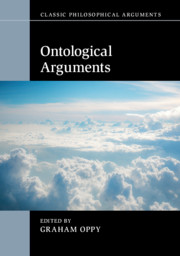
-
Select format
-
- Publisher:
- Cambridge University Press
- Publication date:
- 01 November 2018
- 08 November 2018
- ISBN:
- 9781316402443
- 9781107123632
- 9781107559127
- Dimensions:
- (228 x 152 mm)
- Weight & Pages:
- 0.67kg, 294 Pages
- Dimensions:
- (228 x 152 mm)
- Weight & Pages:
- 0.54kg, 294 Pages
You may already have access via personal or institutional login
Book description
Ontological arguments are one of the main classes of arguments for the existence of God, and have been influential from the Middle Ages right up until the present time. This accessible volume offers a comprehensive survey and assessment of them, starting with a sequence of chapters charting their history - from Anselm and Aquinas, via Descartes, Leibniz, Kant and Hegel, to Gödel, Plantinga, Lewis and Tichý. This is followed by chapters on the most important topics to have emerged in the discussion of ontological arguments: the relationship between conceivability and possibility, the charge that ontological arguments beg the question, and the nature of existence. The volume as a whole shows clearly how these arguments emerged and developed, how we should think about them, and why they remain important today.
Reviews
'The volume will serve as an excellent text for advanced courses on philosophical theology or seminars on ontological arguments, and even as a supplementary text for surveys of philosophy of religion. Otherwise it makes a nice addition to the student library …'
Kevin J. Harrelson Source: International Journal for Philosophy of Religion
Contents
Metrics
Altmetric attention score
Full text views
Full text views help Loading metrics...
Loading metrics...
* Views captured on Cambridge Core between #date#. This data will be updated every 24 hours.
Usage data cannot currently be displayed.
Accessibility standard: Unknown
Why this information is here
This section outlines the accessibility features of this content - including support for screen readers, full keyboard navigation and high-contrast display options. This may not be relevant for you.
Accessibility Information
Accessibility compliance for the HTML of this book is currently unknown and may be updated in the future.


